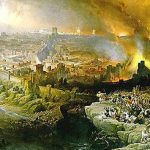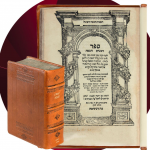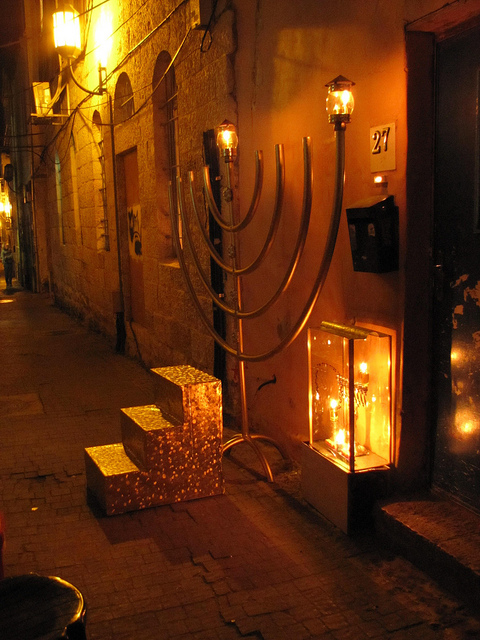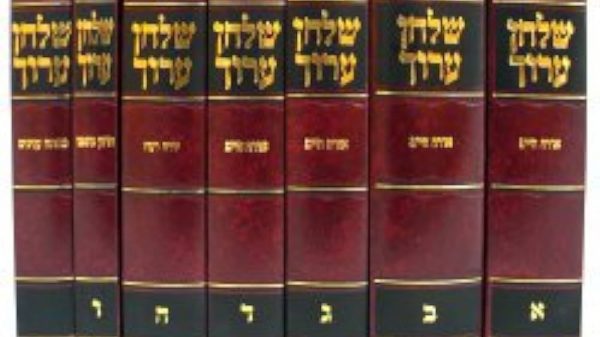Click here to download PDF
The Exile – Israel sandwich
Parshas Masei is always one of the Parshas we read during the three weeks. It has clear allusions to “Golus”- exile which is the sad state that we actively mourn during this time. It contains the laws of the unintentional murderer who himself must go into exile. That is the predicament of the individual that parallels the predicament of our nation. There’s an interesting pattern to point out: the other topics in this Parsha deal with the land of Israel – the opposite of exile. The topics include how the land is to be apportioned and its boundaries, and the special ruling that was enacted that the daughters of Tzelafchad must only marry within their tribe so their inheritance should not wind up by another tribe. The Parsha opens with a detailed count of all the places the Jews traveled thru in course of their 40 years in the desert. Then it talks about how to apportion the land of Israel and then it goes into the laws of the unintentional murder that must go into exile. The Parsha concludes with the special injunction that the daughters of Tzelafchad must marry within their tribe to keep the apportioning of the land of Israel within the designated tribes. The pattern is exile, land of Israel, exile, land of Israel. What is the significance of that sequence?
The 42 Stops
The Parsha opens with the detailed list of all the places the Jewish people traveled thru during the 40 years in the desert. It could be constructed for the most part by following the route that they took from the time they left Egypt. Even if that method will not give us the complete list, why is the complete list significant? The Rambam in the Moreh Nevuchim says that this is from the “secrets of Torah” but he does offer a “down to earth” idea that giving the names of all the places, which can be found on the map and visited, reinforces our faith that all the stories of the miracles in the desert are real (Obviously there’s more to it than that if the Rambam first qualified this list of places as being from the “secrets of Torah” the Rambam just did not want to reveal what that secret is). Many Chassidic works in this week’s parsha bring a tradition that the Baal Shem Tov had said that just like the Jewish people had 42 stations on their journey to the land of Israel so also every Jewish soul has to go through 42 stations in course of his life on earth. Can we get a glimpse into a taste of the secrets that the Rambam and Baal Shem Tov allude to?
After the Parsha opens: “These are the travels of the Jewish people……” then it inserts “and Moshe wrote their points of departure to their travels by word of Hashem and these are their travels to their departures”. The second half of the pasuk is not only repeating what was said already but it is reversing the order – traveling to their points of departure! What does that mean?
The Way Back
The midrash quoted by Rashi gives the following metaphor: “a king had a sick son who he had to take on a long journey to a distant place to get the medical treatment that he needed. On the way back from the successful treatment they travel through the places that they went through on their way there and they start reminiscing ‘remember? this place is where your head hurt, this is where we were cold….etc. so also Hashem told Moshe to write down all the places were the Jewish people angered me.” The metaphor and the case at hand are not congruent. Who here is sick and seeking treatment? The ‘reminiscing’ is on the journey back, over here the Jewish people are on a day one-way journey to the land of Israel. We could understand why they’re reminiscing about their adventures, but here Hashem says the specify all the places where they angered me, who wants to remember that?
Exile
The list of all these travels is just a 13 day journey, so why did it take 40 years? Because of the sin of the spies that whole generation had to die out before entering the land of Israel. The sin of the spies also laid down the precedent that Tisha b’Av will be a multi-generational day of tragedy. it was the day the two Temples were destroyed, and we were cast into exile. The same sin that triggered the three weeks that culminates with Tisha b’Av also made the wandering in the desert for 40 years necessary. It is not a coincidence we read about these wanderings during the three weeks that lead up to Tisha b’Av because they were both created from the same sin of the spies and they both result in exile. Wandering around the desert when the destinations only days away is most definitely exile and the result of the Temples being destroyed was our being dispersed. The unintentional murderer goes into exile. Kayin got a commuted sentence for his murdering Hevel and instead of being killed he had to ‘wander the earth’. Adam was warned “on the day that you eat from it you will surely die” but he got a delayed sentence and he was “chased out of Eden”. The destruction of the Temples was also commuted sentences. Chazal described it as “Hashem took out the wrath of Divine judgment on sticks and stones” – but it did not save us from exile. Why is it that when the crime is so severe that it deserves death, but the perpetrator is spared, exile kicks in? what is it about exile?
Fragmentation & Dispersal
When severe crimes such as murder are committed, they cause fragmentation and dispersal. When a person is killed his soul and body separate. If the murder is intentional and the killer is unrepentant and deserves no mercy, he himself is killed. If he did it unintentionally or got a commuted sentence like Kayin or Adam, he must at least feel the effects of the deed that he did. He fragmented body and soul and the soul will go to heaven and the body will go down to the earth so also, he must leave his home and be separated from his community. The same is true on the national level. Hashem’s Divine Presence dwells amongst the Jewish people like a soul dwells in the body. The destruction of the Temple is like national death it’s to damage the “National body” so as the “National soul” which is the Divine Presence leaves and parallel to that the Jewish people also must go into exile.
Restoration
The components that fragmented get scattered. Even when a misdeed is not nearly as severe as murder or causing the ‘national death’ of the destruction of the Temple, whenever we do evil that increases the presence of evil in the world and the presence of evil will displace goodness. it’s not enough to eradicate the evil but rather the good that has been displaced needs to be restored to its proper place. Those components can and must be re-gathered and re-assembled and that is the constructive mission of the Jewish people in exile. Hashem punishes us for the constructive purpose of making things right. As we are transversing the globe we are actually picking up the pieces that got scattered, as Chazal say “when Jewish people went into exile the Divine Presence was exiled with them” and we have to pick up those ‘sparks’ of the Divine Presence scattered around the globe when it lost its ‘body’ which is the Temple in Yerushalayim. If we can restore the good to its proper place it will push the evil in its place out of reality. The Gemara in Yevamos says that “the Jewish people were exiled in order to collect “Geirim”-converts”. The commentaries explain that because of our sins goodness and holy sparks were displaced from their rightful place and we go into exile to collect them and it is not limited to converts in the literal sense who are holy souls that got displaced but it is also all sparks of holiness that were displaced because of our sins. We need to collect them and bring them back with us to their rightful place in the Kingdom of Hashem in the land of Israel.
Round Trip
With this we can get another another angle on a principle that the Maharal says in his book “Netzach Yisroel” that the exile is a facilitator for the redemption. We go into exile to pick up the pieces that we need to bring back to the land of Israel. This explains the secret of the sequence of the topics in this week’s parsha: exile, land of Israel, exile, land of Israel. The purpose of the exile is to make our way back to the land of Israel after having collected what got fragmented and dispersed. How apropos that in our days we are witnessing the Jewish people coming back to land of Israel and they’re coming back with all forms of different methodologies of learning Torah and serving Hashem named after places in the diaspora where these methods were developed. Whether it’s the Talmud Bavli, Sefard, Ashkenaz, Brisk, or Belz. This is the secret behind what Chazal say, “all the Batei Knesiyos and Batei Midrashos will be uprooted and implanted in the land of Israel”.
Our Merit
Any thinking person must wonder why all the generations that were born in exile are suffering for sin perpetrated by their forefathers that caused the exile. The Gemara dealt with this question when it said, “let us be grateful to our forefather that they sinned because if they had not sinned it would be as if we were never born”. We’ve mentioned previously (see “Even Shesiya” Balak 5779) the purpose of generations is to fix what our forefathers did wrong, starting with Adam. If they had not sinned, we probably would’ve never been born, because we wouldn’t be needed. we are picking up the pieces for them but if there weren’t pieces to be picked up, we may have never been born in the first place and had the opportunity to have our own identity and our own share in the world to come. If not for their sins, we would’ve just been incorporated in the identities of our forefathers.
The Travels in the Desert
Even prior to the sin of the spies was the sin of the golden calf that brought death back into the world. Already then Hashem said that this sin will be defrayed over many generations and this is the secret of these travels. These travels were laying down the precedent for all generations that we can go and find the pieces that need to be collected and restore them to their rightful place. They were written in the Torah as an eternal message for all generations that we’re going to successfully pick up the pieces of what has been fragmented by our sins and the sins of our forefathers. With this we could have a glimpse into the depths of the ‘secrets of Torah’ that the Rambam alluded to and the Baal Shem Tov was a bit more specific about when he said every Neshama has to make 42 stops in course of his lifetime because the whole reason why we were born was to pick up the pieces and that mission is rooted in the 42 stops that that generation went through.
The Midrash
Now we can reexamine the Midrash and see the perfect symmetry between the metaphor and the accounts of the travels in the desert. It starts off that “the son of the King is sick and needs to go to a faraway place….” this refers to Jewish people that are spiritually sick. What is sickness? Sickness is when health is fragmented or disrupted because of the penetration of a wound or some germs or parasite. “Having to go to a faraway place to be healed…” that’s the necessity to go into exile to pick up the missing pieces. “On the way back….” meaning when the mission is accomplished, they are nostalgic about the adventures that they went through because they were all necessary steps in the process of the adventure of getting healed. So also the Jewish people even though these exiles were as a result of angering Hashem but nonetheless in a hidden way the exile was also the solution to that anger and turned the situation on its Head and we turned that disgrace into honor because we created Torah there and collected converts. The precedent to be able to do that was these 42 stops that they made in the desert on their way to the land of Israel laying the precedent for all future return Journeys to Israel.
Journey to the Starting Point
With this we can understand the Pasuk “And Moshe wrote their points of departure to their travels by word of Hashem and these are their travels to their points of departure” – it lays down a eternal message and a precedent for all generations that we can suffer exile to find what we lost we depart from a point of origin and we travel for the purpose to gather what we lost in order to travel back to our point of departure and bring back home all the holy sparks.










